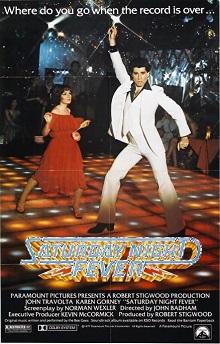
Back Saturday Night Fever AN حمى ليلة السبت (فيلم) Arabic حمى ليلة السبت (فيلم) ARZ Şənbə gecəsi qızdırması Azerbaijani Треска в събота вечер Bulgarian Febre del dissabte nit Catalan Horečka sobotní noci Czech Saturday Night Fever Welsh Saturday Night Fever (Film) German Πυρετός το Σαββατόβραδο Greek
| Saturday Night Fever | |
|---|---|
 Theatrical release poster | |
| Directed by | John Badham |
| Screenplay by | Norman Wexler |
| Based on | "Tribal Rites of the New Saturday Night" by Nik Cohn |
| Produced by | Robert Stigwood |
| Starring | |
| Cinematography | Ralf D. Bode |
| Edited by | David Rawlins |
| Music by | |
Production company | |
| Distributed by | Paramount Pictures |
Release date | |
Running time | 119 minutes[3] |
| Country | United States[1] |
| Language | English |
| Budget | $3.5 million[4] |
| Box office | $237.1 million[5] |
Saturday Night Fever is a 1977 American dance drama film directed by John Badham and produced by Robert Stigwood. It stars John Travolta as Tony Manero, a young Italian-American man who spends his weekends dancing and drinking at a local discothèque while dealing with social tensions and disillusionment in his working class ethnic neighborhood in Brooklyn. The story is based on "Tribal Rites of the New Saturday Night", a mostly fictional 1976 New York article by music writer Nik Cohn.
A major critical and commercial success, Saturday Night Fever had a tremendous impact on the popular culture of the late 1970s. It helped popularize disco around the world and initiated a series of collaborations between film studios and record labels. It made Travolta, already well known from his role in the popular TV sitcom Welcome Back, Kotter, a household name. He was nominated for the Academy Award for Best Actor for his performance, at the time becoming the fourth-youngest nominee in the category. The film showcases aspects of the music, dancing, and subculture surrounding the disco era, including symphony-orchestrated melodies, haute couture styles of clothing, pre-AIDS sexual promiscuity, and graceful choreography. The Saturday Night Fever soundtrack, featuring songs by the Bee Gees, is one of the best-selling soundtrack albums worldwide. Travolta reprised his role of Tony Manero in Staying Alive in 1983, which was panned by critics despite being successful at the box office.
In 2010, Saturday Night Fever was deemed "culturally, historically, or aesthetically significant" by the Library of Congress and selected for preservation in the United States National Film Registry.
Adjusted for inflation, it is one of the highest-grossing R-rated films released in the U.S. in the 1970s, with a total box office gross of $673,899,098 in 2024.[6]
- ^ a b c Saturday Night Fever at the AFI Catalog of Feature Films
- ^ ""Saturday Night Fever" premieres in LA". History.com.
- ^ "Saturday Night Fever (1977)". British Board of Film Classification. Retrieved September 5, 2017.
- ^ Loftis, Ryan (December 12, 2012), Saturday Night Fever Turns 35. Suite101. Retrieved April 1, 2013.
- ^ "Saturday Night Fever". Box Office Mojo. Retrieved May 26, 2014.
- ^ "All Time Domestic Inflation Adjusted Box Office". www.the-numbers.com. Archived from the original on April 9, 2024. Retrieved May 6, 2024.